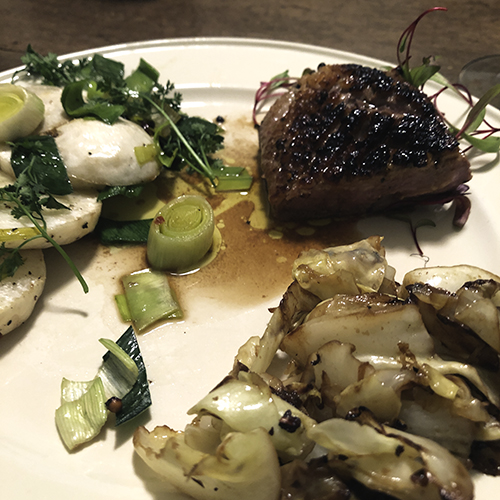
The little halved duck breast resting on the far side of the plate looks undersize here, but its wonderful, assertive flavors survived the power of turnips leeks, and cabbage, lending another understanding to the early 20th century obsession with a “balanced meal”.
- one 12-ounce breast of duck from Hudson Valley Duck Farm, the fatty, skin side scored in tight cross hatching with a very sharp knife, the breasts both rubbed, top and bottom with a mixture of sea salt, freshly ground black pepper, and a little turbinado sugar, then left standing on the counter for about 45 minutes to an hour, pan-fried over medium heat, fatty side down first, then turning once, inside a small oval enameled cast iron pan for a total of about 9-10 minutes, or perhaps until an instant read thermometer (which I almost never use with duck breasts) shows 135º, draining the oil after the first few minutes, removed when medium rare, left to sit for several minutes, covered loosely with tin foil, before they were drizzled with a little lemon juice and some Whole Foods Market house Portuguese olive oil, garnished with micro red chard from Two Guys from Woodbridge
- three medium purple-top turnips from Norwich Meadows Farm cut into half-inch pieces, tossed with oil, salt, pepper, and a tiny amount of crushed dried Santa Fe seasoning pepper form Eckerton Hill Farm, roasted in an unglazed ceramic pan for about 4-45 minutes at 425º, one large leak from Norwich Meadows Farm, also cut into half-inch pieces and tossed in the same mixture enjoyed by the turnips, added near the end of the cooking time, garnished with chervil from Eckerton Hill Farm
- the central part of a white cone cabbage (a very sturdy vegetable, it had been waiting inside the refrigerator for some time, and its outer leaves had been included in a couple earlier meals) washed, quartered, cored, sliced into one-half-inch ribbons, sautéed in a scant tablespoon of olive oil inside a large heavy, enameled cast iron pot until wilted but still a little crunchy, stirring occasionally, seasoned with sea salt, freshly-ground black pepper, and 8 or so slightly smashed juniper berries, with a few drops of a good balsamic vinegar added as well, and stirred over the heat for only a moment, arranged on the plates and finished with a drizzle of olive oil
- the wine was a Washington State cabernet sauvignon, Christopher Michael, Cabernet Sauvignon 2018, from Astor Wines
- the music was the 1716 tragédie en musique by Charles-Hubert Gervais, ‘Hypermnestre’ (the eponymous Danaid who was the only one of 50 sisters who did not kill her husband on their wedding night), in a performance by the Orfeo Orchestra and Purcell Choir, conducted by Gyorgy Vashegyi